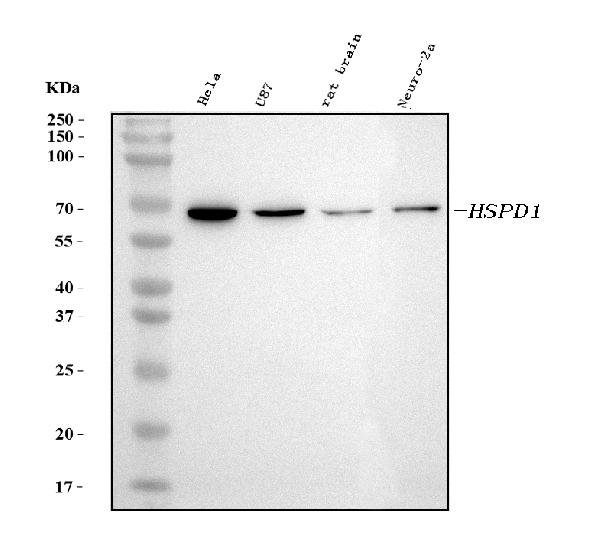Product Info Summary
| SKU: | MA1049 |
|---|---|
| Size: | 100 μg/vial |
| Reactive Species: | Chicken, Human, Mouse, Rat |
| Host: | Mouse |
| Application: | IHC, WB |
Customers Who Bought This Also Bought
Product info
Product Name
Anti-HSP60 Hspd1 Antibody (Monoclonal, LK1)
SKU/Catalog Number
MA1049
Size
100 μg/vial
Form
Lyophilized
Description
Boster Bio Anti-HSP60 Hspd1 Antibody (Monoclonal, LK1) catalog # MA1049. Tested in IHC, WB applications. This antibody reacts with Chicken, Human, Mouse, Rat.
Storage & Handling
Store at -20˚C for one year from date of receipt. After reconstitution, at 4˚C for one month. It can also be aliquotted and stored frozen at -20˚C for six months. Avoid repeated freeze-thaw cycles.
Cite This Product
Anti-HSP60 Hspd1 Antibody (Monoclonal, LK1) (Boster Biological Technology, Pleasanton CA, USA, Catalog # MA1049)
Host
Mouse
Contents
Mouse ascites fluid, 1.2% sodium acetate, 2mg BSA, with 0.01mg NaN3 as preservative.
Clonality
Monoclonal
Clone Number
LK1
Isotype
Mouse IgG1
Immunogen
Recombinant human heat shock protein 60 (HSP60)
*Blocking peptide can be purchased. Costs vary based on immunogen length. Contact us for pricing.
Cross-reactivity
No cross-reactivity with other proteins
Reactive Species
MA1049 is reactive to Hspd1 in Chicken, Human, Mouse, Rat
Reconstitution
Add 1ml of PBS buffer will yield a concentration of 100ug/ml.
Observed Molecular Weight
65 kDa
Calculated molecular weight
60955 MW
Background of HSP60
Heat shock 60KD protein (HSP60) is a member of the chaperonin class of protein factors and the nuclear encoded mitochondrial HSP60 is required for the assembly into oligomeric complexes of proteins imported into the mitochondrial matrix. HSP60 is linked head to head comprising approximately 17 kb and consist of 12 exons. HSP60 is a self-molecule, it can downregulate adaptive immune responses by upregulating Tregs innately through TLR2 signaling.
Antibody Validation
Boster validates all antibodies on WB, IHC, ICC, Immunofluorescence, and ELISA with known positive control and negative samples to ensure specificity and high affinity, including thorough antibody incubations.
Application & Images
Applications
MA1049 is guaranteed for IHC, WB Boster Guarantee
Assay Dilutions Recommendation
The recommendations below provide a starting point for assay optimization. The actual working concentration varies and should be decided by the user.
Western blot, 2-4μg/ml, Human, chicken, rat
Immunohistochemistry (Paraffin-embedded Section), 4-8μg/ml, Human, chicken, mouse, rat, By Heat
Positive Control
WB: human Hela whole cell, human U87 whole cell, rat brain tissue, mouse Neuro-2a whole cell
Validation Images & Assay Conditions

Click image to see more details
Figure 1. Western blot analysis of HSP60 using anti-HSP60 antibody (MA1049).
Electrophoresis was performed on a 5-20% SDS-PAGE gel at 70V (Stacking gel) / 90V (Resolving gel) for 2-3 hours. The sample well of each lane was loaded with 30 ug of sample under reducing conditions.
Lane 1: human Hela whole cell lysates,
Lane 2: human U87 whole cell lysates,
Lane 3: rat brain tissue lysates,
Lane 4: mouse Neuro-2a whole cell lysates.
After electrophoresis, proteins were transferred to a nitrocellulose membrane at 150 mA for 50-90 minutes. Blocked the membrane with 5% non-fat milk/TBS for 1.5 hour at RT. The membrane was incubated with mouse anti-HSP60 antigen affinity purified monoclonal antibody (Catalog # MA1049) at 2 μg/mL overnight at 4°C, then washed with TBS-0.1%Tween 3 times with 5 minutes each and probed with a goat anti-mouse IgG-HRP secondary antibody at a dilution of 1:5000 for 1.5 hour at RT. The signal is developed using an Enhanced Chemiluminescent detection (ECL) kit (Catalog # EK1001) with Tanon 5200 system. A specific band was detected for HSP60 at approximately 65 kDa. The expected band size for HSP60 is at 65 kDa.
Protein Target Info & Infographic
Gene/Protein Information For Hspd1 (Source: Uniprot.org, NCBI)
Gene Name
Hspd1
Full Name
60 kDa heat shock protein, mitochondrial
Weight
60955 MW
Superfamily
chaperonin (HSP60) family
Alternative Names
60 kDa heat shock protein, mitochondrial;60 kDa chaperonin;Chaperonin 60;CPN60;HSP-65;Heat shock protein 60;HSP-60;Hsp60;Mitochondrial matrix protein P1;Hspd1;Hsp60; HSPD1 CPN60, GROEL, HLD4, HSP-60, HSP60, HSP65, HuCHA60, SPG13 heat shock protein family D (Hsp60) member 1 60 kDa heat shock protein, mitochondrial|60 kDa chaperonin|P60 lymphocyte protein|chaperonin 60|epididymis secretory sperm binding protein|heat shock 60kDa protein 1 (chaperonin)|heat shock protein 65|mitochondrial matrix protein P1|short heat shock protein 60 Hsp60s1
*If product is indicated to react with multiple species, protein info is based on the gene entry specified above in "Species".For more info on Hspd1, check out the Hspd1 Infographic

We have 30,000+ of these available, one for each gene! Check them out.
In this infographic, you will see the following information for Hspd1: database IDs, superfamily, protein function, synonyms, molecular weight, chromosomal locations, tissues of expression, subcellular locations, post-translational modifications, and related diseases, research areas & pathways. If you want to see more information included, or would like to contribute to it and be acknowledged, please contact [email protected].
Specific Publications For Anti-HSP60 Hspd1 Antibody (Monoclonal, LK1) (MA1049)
Loading publications
Recommended Resources
Here are featured tools and databases that you might find useful.
- Boster's Pathways Library
- Protein Databases
- Bioscience Research Protocol Resources
- Data Processing & Analysis Software
- Photo Editing Software
- Scientific Literature Resources
- Research Paper Management Tools
- Molecular Biology Software
- Primer Design Tools
- Bioinformatics Tools
- Phylogenetic Tree Analysis
Customer Reviews
Have you used Anti-HSP60 Hspd1 Antibody (Monoclonal, LK1)?
Submit a review and receive an Amazon gift card.
- $30 for a review with an image
0 Reviews For Anti-HSP60 Hspd1 Antibody (Monoclonal, LK1)
Customer Q&As
Have a question?
Find answers in Q&As, reviews.
Can't find your answer?
Submit your question




